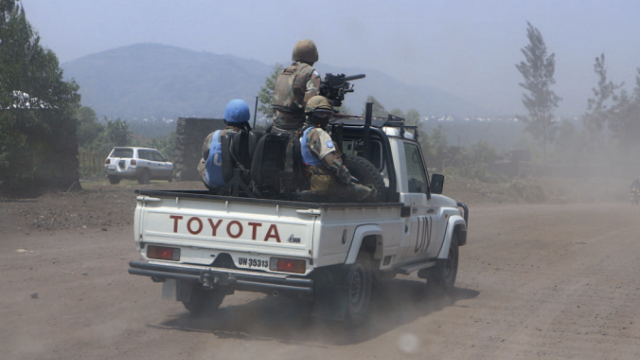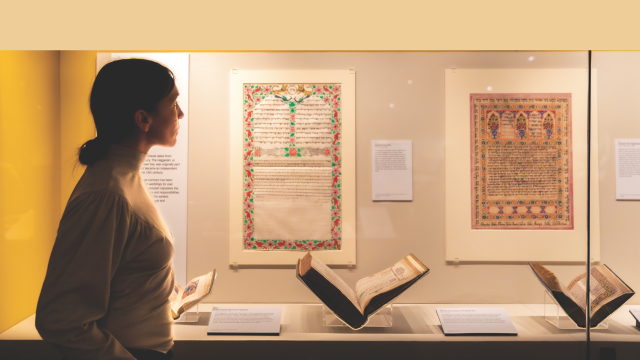-
QUALIFICATIONS
- For Linguists Worldwide
- For UK Public Services
- Preparation
- Policies & Regulation
-
MEMBERSHIP
- Join CIOL
- Membership grades
- NEW for Language Lovers
- Chartered Linguist
- Already a member?
- Professional conduct
- Business & Corporate Partners
-
ASSESSMENTS
- For Second Language Speakers
- English as a Second Language
-
EVENTS & TRAINING
- CPD, Webinars & Training
- CIOL Conference Season 2025
- Events & Networks
- CIOL Mentoring
-
NEWS & VOICES
- News & Voices
- CIOL eNews
- CIOL Awards
- The Linguist
- Jobs & Ads
-
RESOURCES
- For Translators & Interpreters
- For Universities & Students
- Standards & Norms
- CIOL & AI
- All Party Parliamentary Group
- In the UK
- UK Public Services
- Find-a-Linguist
Hearts and minds
 Bokani Hart considers how language gaps are impeding the UN’s peacekeeping mission in eastern Congo.
Bokani Hart considers how language gaps are impeding the UN’s peacekeeping mission in eastern Congo.
Once again, the eastern provinces of the Democratic Republic of the Congo (DRC) are on a knife edge. And, once again, the United Nations peacekeeping mission in the DRC (MONUSCO) is in the firing line for allegedly not doing enough to protect civilians from the armed groups that have been terrorising local communities there for decades. In late July, violent clashes erupted in Goma, the capital of North Kivu province, in the latest round of anti-MONUSCO protests, which quickly spread. According to the Congolese government, 36 people, including four UN peacekeepers, were killed.1
Winning hearts and minds in the DRC continues to be an uphill battle for one of the UN’s largest peacekeeping missions. That’s despite its robust Chapter VII mandate, which authorises the use of force in highly volatile regions. The UN would argue that although MONUSCO currently has over 17,000 peacekeepers, they operate in a vast and often inaccessible country with 95 million inhabitants. This has severely hampered its ability to fulfil its peacekeeping mandate. But there’s still plenty of room for improvement.
In March 2018, at the UN Security Council’s High-Level Debate on Collective Action to Improve UN Peacekeeping Operations, the UN Secretary-General, António Guterres, stated: “UN peacekeepers are often under-equipped, under-prepared and unready for the dangerous environments in which they now operate. There are gaps in command and control, in culture, in equipment and in training. Our peacekeepers are vulnerable, and they are targetted for attack.”2
He went on to launch Action for Peacekeeping (A4P) and the ‘Declaration of Shared Commitments on United Nations Peacekeeping Operations’. Judging from the anti-MONUSCO protests, translating these commitments into meaningful action remains a challenge, especially in eastern Congo.
Introduction to the DRC
I first travelled to the DRC in early 2005 to work for an international humanitarian aid organisation based in the capital, Kinshasa. This was in the run-up to the DRC’s historic 2006 presidential and legislative elections – the first since Congo’s independence in 1960. I was excited at the thought of participating in this democratic process and made a point of learning as much as I could about the country before I arrived. One of my first responsibilities was to work with local partners on developing voter education materials in both French (the official language) and Lingala (the lingua franca of northwestern DRC), aimed at encouraging women, in particular, to participate in the electoral process.
I was already a fan of Congolese art, music and literature, but had to fill in some historical gaps. I read books such as Adam Hochschild’s King Leopold’s Ghost: A story of greed, terror and heroism in colonial Africa and immersed myself in analyses of the rapidly evolving situation on the ground. I couldn’t imagine living and working in such a complex and challenging environment without, at the very least, speaking French and having a basic understanding of Congolese history.
It wasn’t until I relocated to eastern Congo a few years later, to work as a Civil Affairs Coordinator for MONUSCO’s South Kivu office, that I realised just how strained the relationship was between the Congolese government and the mission. This had a knock-on effect on MONUSCO South Kivu’s relationship with local authorities and communities. Misunderstandings surrounding MONUSCO’s presence in the DRC were often exploited by armed groups to incite violence against the peacekeepers, especially in remote and inaccessible parts of the province.
Civil Affairs Officers
Civil Affairs Officers are civilian peacekeepers who play a key role in UN peacekeeping operations mainly focused on protecting civilians, preventing and managing local conflicts, and supporting the restoration of State authority in conflict-affected areas. They usually work alongside troops in the field, where they act as a bridge between the peacekeeping mission and local communities.
They are often required to coordinate and facilitate the field visits of other UN actors, such as the UN Refugee Agency, as well as local and international humanitarian aid organisations. As a Civil Affairs Coordinator,
I also worked at a provincial level and was often required to provide visiting delegations from UN HQ in New York with French/English interpretation services during meetings with provincial government authorities, the UN Country Team, civil society organisations, and local and international journalists.
The ability to communicate in local languages is an essential part of Civil Affairs Officers’ work. Without their linguistic support, field-based troops, who are often accused of barricading themselves in their barracks during attacks by armed groups, struggle to fulfil their protection of civilians mandate.
One problem is the ambiguity surrounding the interpretation and implementation of MONUSCO’s mandate. The preamble states that the Congolese government is primarily responsible for protecting civilians within its borders. So although the government agreed to host MONUSCO, it continues to scapegoat the mission to disguise its own failure to protect civilians caught up in violent conflict.
Language barriers make it hard to counter mis-/disinformation spread by hostile armed groups and authorities, especially in remote parts of the country. In South Kivu’s Shabunda territory, for example, heavily armed elements stormed a humanitarian coordination meeting in August 2011 looking for peacekeepers who they suspected of spying. A month later they abducted and seriously assaulted an Electoral Commission employee in Tchombi in the mistaken belief that he was a MONUSCO peacekeeper.
In an effort to promote a greater understanding of MONUSCO’s mandate, and stop the spread of fake news, South Kivu’s field-based Civil Affairs Officers took to explaining parts of it in Swahili – the most widely spoken language in eastern DRC – during their daily interactions with local communities. However, these overworked and under-resourced officers do not have the time to sit down and translate the mandate, even if they have the language skills to do so.
Lack of local language skills
Another major problem is that UN peacekeepers rarely speak their host countries’ local languages. This is particularly acute in Africa, where most of the UN’s largest peacekeeping missions are based. A4P’s Declaration of Shared Commitments asserts the Secretary-General’s commitment “to work with Member States to generate the necessary specialised capabilities, including language skills…”, which are a prerequisite for successful peacekeeping.
In the DRC, the hostility and mistrust that MONUSCO’s internationally recruited peacekeepers encounter in the field are exacerbated by their inability to speak French or any of the country’s regional languages. India, Pakistan and Bangladesh lead the North Kivu, South Kivu and Ituri brigades respectively, but virtually none of the troops speak French or Swahili. This makes it
almost impossible for them to engage with the local communities they are mandated to protect without the help of locally recruited Civil Affairs Officers. However, such officers can’t be everywhere at once, which highlights the importance of language training for all UN peacekeepers.
On the other hand, French-speaking police officers from West Africa – primarily Senegal – and Swahili-speaking troops in MONUSCO’s specialised Force Intervention Brigade are much better equipped, culturally and linguistically, to bridge the communication gaps between the mission and local communities.
Why training is vital
A4P’s Declaration of Shared Commitments stresses the importance of training and capacity-building for improving the performance and effectiveness of UN peacekeepers, but it needs to do more than pay lip service to language training. The mandatory pre-deployment training I attended for civilian peacekeepers focused on topics such as safety and security in the field, conduct and discipline, and the prevention of sexual exploitation and abuse. It did not include language or intercultural skills training.
The only mandatory in-mission training focused exclusively on safety and security issues. MONUSCO South Kivu did offer optional French and Swahili language lessons, but they were poorly attended, especially by military and police personnel, who needed them most.
The successful implementation of UN peacekeeping mandates in complex security environments depends on several key factors. Not only are clear and unambiguous mandates, political will, adequate resources, and international and regional cooperation essential, but also language and intercultural communication skills. Only then will it be possible to build the necessary relationships with host governments and local communities based on mutual trust and understanding.
Notes
1 tinyurl.com/OkapiMonusco
2 tinyurl.com/UNSGdebate
Filter by category
More
The Chartered Institute of Linguists (CIOL), Incorporated by Royal Charter, Registered in England and Wales Number RC 000808 and the IoL Educational Trust (IoLET), trading as CIOL Qualifications, Company limited by Guarantee, Registered in England and Wales Number 04297497 and Registered Charity Number 1090263. CIOL is a not-for-profit organisation.








